Here.
-
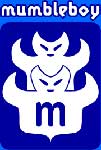
in Art & Design
-
From SportsShooter:
This is video of the judging panel in action. Wally Skalij (Los Angeles Times), Myung Chun (Los Angeles Times), Matt A. Brown (Los Angeles freelance photographer), Rick Rickman (freelance photographer and Brooks Institute faculty member) and Robert Hanashiro (USA TODAY), spent the day together working to decide the winners in five categories and select a “Picture of the Year” for the (best entry).
Here.
in Contests
-

in Art & Design
-
From Rob Galbraith:
The latest release of the pro photo browser from Camera Bits adds uploading to a PhotoShelter account from within the application, viewing and processing of RAW files (Mac version only; OS X 10.4.6 required), more flexible CD/DVD writing, the ability to read code replacement data out of multiple text files, several new variables (includes one that returns a camera’s total shutter actuations) and many other improvements and fixes.
Here.
-

Folks, it’s finally happening. NoTxt Magazine is open for business.
NoTxt is an online outlet for visual artists of all stripes, and intends to showcase the best work out there from photographers, designers, illustrators, pranksters, cel phone cams, web artists, graffiti, stickers, etc.
Submissions of all styles are being accepted now for our debut issue, deadline for the first issue, coming in June, is May 25.
A little more information at www.notxt.org. Come around and show us what you got. Free to submit, free to be published, free exposure if you make it in.
Editors: Trent Nelson, Grayson West.
in Misc
-
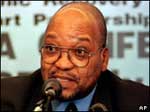
Mr Zuma remained composed as he answered journalists’ questions.
But he became visibly upset when a journalist challenged him on his admission made in court and widely reported in the media, that he had showered after sex to reduce the risk of HIV infection.
“If you’ve been in the kitchen, my dear, peeling onions, you wash your hands afterwards,” he said.
Here.
in News
-
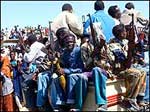
“Every corner of the city, the militias of the same rival groups have taken up positions to prepare for more lethal fighting… there is no cold place in an inferno.”
The Islamic courts have restored order to some parts of the city by providing justice under Sharia – Islamic law.
The alliance of warlords recently created the Alliance for the Restoration of Peace and Counter-Terrorism.
Here.
in News
-
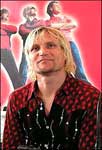
Hand-picked by the festival’s organiser, veteran Ukrainian rocker and cultural patriot Oleg Skrypka, they had to fulfil three festival conditions:
• To sing professionally and live (ie – not miming)
• To play rock, hip-hop or anything other than pop
• To sing in Ukrainian.
Here.
in Music
-
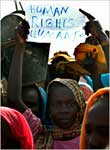
“Janjaweed, janjaweed!” the crowd shouted, grasping at a Sudanese man who works for Oxfam, the British aid organization, as he tried to flee the melee in a car. They were using the local term for the Arab militias who have aligned with the government and carried out brutal attacks on non-Arab villages across the vast arid, countryside of Darfur, a region the in western Sudan the size of France.
The anger in the swirling crowd was palpable when they set upon the aid worker, a Sudanese man who has been working as a primary health coordinator for Oxfam for many years. One young man wielded a knife that came so near the worker’s flesh it sheared his shirt. Women tugged at his legs. Boys in filthy white robes wielding sticks and rocks smashed the windows of the United Nations car in which he was trying to get away.
Here.
in News
-
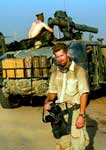
 From The Digital Journalist (link to gallery at bottom of page):
From The Digital Journalist (link to gallery at bottom of page):Rick Loomis says that survival skills he learned as a boy in Loxahatchee help him at the front. Zucchino observed that, “Raised in rural south Florida, Loomis is comfortable around guns, knives, fast cars and motorcycles. In other words, he’s part redneck. On a grueling three-week mission with a U.S. Special Forces team last winter, Loomis not only showed the Green Berets how to ford a river in a four-wheel-drive vehicle, he also beat them hands-down in an improvised distance-jumping contest with the soldiers’ own dirt bike.”
Here.
-
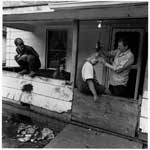
 From The Digital Journalist (link to gallery at bottom of page):
From The Digital Journalist (link to gallery at bottom of page):Ken Light, who teaches photography at the Graduate School of Journalism at the University of California, Berkeley, has five previous documentary books to his credit and also produced Witness In Our Time: Working Lives of Documentary Photographers (Smithsonian Press, October 2000). He prefers photographing with the medium format (but used 35mm for his book Texas Death Row, where he wanted the discretion and high film speed it allows). For Coal Hollow he used Mamiya 6s, a rangefinder camera with a 6 x 6 cm negative that handles like a Leica. Although working with an eye-level viewfinder, he often gets low with the camera, going eye-to-eye with a short dog or looking up at faces. His close-to-the-face portraits leave us no doubt that many of these people have had hard, damaging lives without decent medical care. All of the 82 duotones are full-square, and nearly fill their 11-inch square pages, allowing full appreciation of their rich tonality and detail. Some believe the square format is a difficult working space – the frame lacks a dominant direction, leaving a potential for static compositions. Ken is a master of the square composition and his images are alive with energy and dynamic interest. In addition to landscapes, signs, portraits, close-ups and environmentals, he records active situations including a tent revival and a wrestling match.
Here.
-
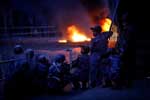
 Brian Sokol, from The Digital Journalist:
Brian Sokol, from The Digital Journalist:Twenty minutes later the calm broke when a volley of rocks and bottles began to rain down on police and protesters alike. Suddenly the air was again full of tear gas and I wiped feverishly at my eyes, trying to shoot frame after frame as figures darted in and out of the bitter fog. Protesters charged at the police screaming, “King Gyanendra is a thief, he stole our country,” and I found myself in a human pile, attempting to protect my cameras and body while being stampeded by the retreating security forces. When the air cleared, I found myself cut off from my friends.
Here.
-
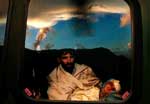
 White House News Photographers Association’s The Eyes of History contest results are in for 2006. Some amazing photographs.
White House News Photographers Association’s The Eyes of History contest results are in for 2006. Some amazing photographs.Photographer of the year: Andrea Bruce, The Washington Post.
Check out the winners gallery, Here.
in Contests
-
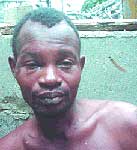
 From the Daily Sun, Nigeria’s King of the Tabloids:
From the Daily Sun, Nigeria’s King of the Tabloids:He also denied killing young Tope Alawoya in a fit of anger.
According to him, trouble started when the victim gave him a blinding slap across the face, for casting aspersions on his parents.He said: “ I know something was behind what happened to me. The way it happened, it was as if I was under the influence of supernatural forces. It couldn’t have been the two bottles of beer. I am a drinker. As he just hammer me the slap, make him for no go, na him I just break the bottle buaaaa for his head.”
Here.
in News
-
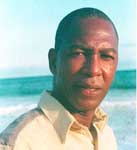
 From the Daily Sun, Nigeria’s King of the Tabloids:
From the Daily Sun, Nigeria’s King of the Tabloids:The whole tomb was upturned, the marble tomb stone unearthed and the corpse exhumed in broad day light by some persons, who were allgedly accompanied by thugs meant to silence any oppositions. The corpse was accordingly taken to unidentified place.
Here.
in News
-
From the Washington Post:
A day after scolding Russia for retreating on democracy, Vice President Cheney flew to oil-rich Kazakhstan yesterday and lavished praise on the autocratic leader of a former Soviet republic (Nursultan Nazarbayev) where opposition parties have been banned, newspapers shut down and advocacy groups intimidated.
Here.
in News
-
From the Washington Post:
On a recent day in April, when U.S. aid officials flew to Lashkar Gah, the provincial capital, with several journalists, they were greeted on the tarmac by a commando-style security team that instructed the visitors on what to do if their vehicles were shot at or bombed, issued everyone flak jackets and closely guarded their convoy at every step.
When the group arrived at a tiny cucumber and eggplant patch, heavily armed Afghan and foreign security guards surrounded it. Later they fanned out across empty poppy fields, and stood guard along a dusty cobblestone road being built by former poppy farmers who are paid $4 per day by USAID.
Here.
in News
-
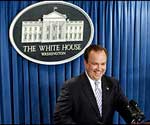
“This country is on a solid track under this president because of his leadership.”
“We’re more interested in looking at the results, not the polls.”
“We are winning in Iraq.”
Here.
in News
-
From Dana Priest, Pulitzer prize winner at the Washington Post:
One senior European counterterrorism official, asked recently for his assessment of Goss’s leadership, responded by saying, “Who?”
Goss, then the Republican chairman of the House intelligence panel, was handpicked by the White House to purge what some in the administration viewed as a cabal of wily spies working to oppose administration policy in Iraq. “He came in to clean up without knowing what he was going to clean up,” one former intelligence official said.
Here.
in News
-
From the Washington Post:
Members of Congress privately predicted that Hayden, who once enjoyed tremendous support on the Hill, would face a contentious confirmation process over the Bush administration’s domestic spying program. Other sensitive issues, such as the existence of secret prisons abroad for terrorism suspects, also are likely to arise.
“The calculus is that would be true about anybody at this point. Given all the other stuff, like secret prisons, the confirmation is going to be tough for anybody,” a senior administration official said.
Here.
in News








